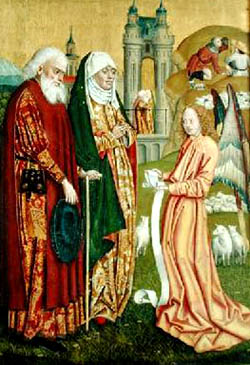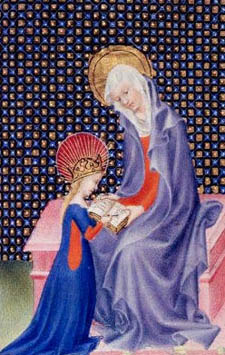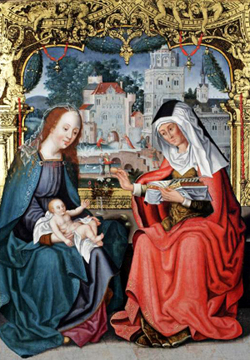 |
The Saint of the Day
St. Anne – July 26
Prof. Plinio Corrêa de Oliveira
Biographical selection:
According to Catherine Emmerick many ancestors of St. Anne were Essenes. Those pious people were descendants of those priests who in the time of Moses and Aaron carried the Ark of the Covenant. They received their rules in the days of Isaiah and Jeremiah.
The Essenes became numerous and fixed themselves in Mount Sinai and Mount Carmel, where Elias had seen God and had received the symbolic vision of Our Lady. Later they migrated to the region of the Jordan. They wore poor and simple apparel. They married, but observed a great purity of customs in the married state. With mutual consent, husband and wife frequently lived apart in distant huts. They also ate apart.

An angel announcing the birth of Mary to St. Joachim and St. Anne
|
Even in those early times some of the forefathers of St. Anne and other members of the Holy Family were found among them. From them sprang those called the Children of the Prophets. One of these holy men advised Anne to marry Joachim, from the tribe of David, because he saw some extraordinary thing would come from this marriage.
Anne was especially dear to her parents. Her birth was predicted by an Angel who painted a large “M” on the wall of her parents’ room. She was not strikingly beautiful, though prettier than others. She was extraordinarily pious, pure and innocent. She was the same at every age, as a maiden, as a mother and as an old woman.
When in her fifth year, Anne was taken to the Temple, as Mary was later. There she remained twelve years, returning home in her 17th year.
Joachim, her future husband, was short and thin, and a man of charming manners. In disposition and morals, he was a superior man. Like St. Anne he had something very distinguished about him. Both had a notable seriousness in their behavior. Very few times have I seen them laughing, although they were neither sad nor melancholic. Both possessed a calm, uniform disposition; even in early youth they had a great maturity.
At an advanced age, after having suffered unspeakable humiliation because of her sterility, St. Anne miraculously conceived Our Lady.
Comments of Prof. Plinio:
There are several things in this selection that deserve some comments.
First, there is the part referring to the Essenes. Almost everything in the Old Covenant had a prophetic aspect, because it prefigured the Church. In this regard, the Essenes were prefigures of the religious life in the Church.
You can see that the graces of the Old Testament were not great enough to permit the state of perfect chastity to be possible for a large number of people. This grace is a very elevated, magnificent one. In the Old Testament it existed in a few, like Elias, but it was a very rare grace. Men and women were given sufficient grace to save themselves, but just a few would keep perfect chastity.

St. Anne instructing Our Lady in holy things
|
Those Essenes lived as married couples. Husband and wives took up a special type of life, observing a kind of religious life. They lived as if they were cenobites, with a house for each family. This life was marked by the men and women eating separately, poverty, and purity. The Essenes were known for an extraordinary purity of customs and having prophets as their leaders.
Second, it is beautiful to see this role of the Prophets: the Essenian movement was an institution directed by a line of Prophets. This institution maintained the good spirit and the salt of orthodoxy in Israel.
Third, you see that the prevision of the birth of Our Lady was somehow communicated to one of those Prophets, who told St. Anne to marry St. Joachim. It is understandable that this would happen, because according to the Carmelite tradition, those Essenes were remote spiritual sons of Elias, who was the Prophet of Our Lady par excellence. So, it is natural that a member of this line of Prophets that began with Elias would announce the birth of the Virgin Mary, who Elias had seen from Mount Carmel prefigured in that small cloud which would bring rain to Israel.
Fourth, it is also interesting that before the birth of St. Anne an angel drew a “M” on the wall of her parents’ bedroom. This was a symbol of her mission to be mother of Mary; she came into the world turned toward the extraordinary maternity of Our Lady, conceived without original sin.
Fifth, perhaps the most beautiful part of the description is the moral profile drawn of St. Anne and St. Joachim. It is very well depicted. They were persons filled with wisdom, not like the modern man and woman, talking about everything superficially, without thinking. No, they used to count, weigh, and measure everything they did and said. This is why they were calm and silent.

St. Anne, the Virgin Mary, and the Christ Child
|
St. Anne did not have an extraordinary beauty, but was pretty of feature. St. Joachim was slender, but a man with very good and charming manners. The couple was unjustly scorned because St. Anne was sterile. In the Old Covenant it was considered shameful to be sterile, because all Jews hoped for the honor to be in the ancestral line of the Messiah. Supposedly a childless couple would be excluded from that blessing, and chastised by God. The people did not realize that St. Joachim and St. Anne were the ones who were blessed as being chosen to be in the line of the Messiah, even though St. Anne was sterile.
It is necessary to emphasize this point. The great plans of God demand that an immense effort be realized. They depend on a long wait, a time that seems wasted. Sometimes we walk in a direction that seems to be the opposite of the plan of God.
Then, at the end of the road, Divine Providence acts. God asks an act of confidence from the person whom He wants to honor by making him part of His plan. He asks him to hope against all hope, to trust against all appearances of reality. The person has to pass through the trial of appearing to be abandoned by God. Afterwards, God confirms his choice and executes His plans with that person. This apparent abandonment and the appearance of being put aside by God is His way to manifest His affection.
In the life of St. Anne this point touches us and is a model for us. Many of the expectations of our vocation put by Our Lady in our souls may not be met for a long time. At times we may even have the impression that they will never be realized. The longer the delay, the more splendidly the promise will be fulfilled. Let us ask St. Anne to help us accept and understand this, and give us the needed strength to follow this road.


  | | Prof. Plinio Corrêa de Oliveira | |
The Saint of the Day features highlights from the lives of saints based on comments made by the late Prof. Plinio Corrêa de Oliveira. Following the example of St. John Bosco who used to make similar talks for the boys of his College, each evening it was Prof. Plinio’s custom to make a short commentary on the lives of the next day’s saint in a meeting for youth in order to encourage them in the practice of virtue and love for the Catholic Church. TIA thought that its readers could profit from these valuable commentaries.
The texts of both the biographical data and the comments come from personal notes taken by Atila S. Guimarães from 1964 to 1995. Given the fact that the source is a personal notebook, it is possible that at times the biographic notes transcribed here will not rigorously follow the original text read by Prof. Plinio. The commentaries have also been adapted and translated for TIA’s site.
|
Saint of the Day | Home | Books | CDs | Search | Contact Us | Donate

© 2002- Tradition in Action, Inc. All Rights Reserved
|
 |

|